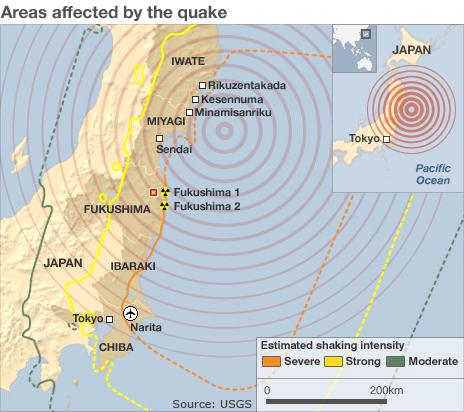Japan quake: Fukushima plant alarming, says Naoto Kan
- Published
Residents of the coastal city of Sendai are continuing the search for survivors amid the devastation
A nuclear plant damaged in Friday's quake remains in an alarming state, Japan's Prime Minister Naoto Kan says.
The casing of a reactor at Fukushima 1 plant exploded on Saturday, and another faces meltdown, but officials said only minimal radiation had been released.
The authorities ordered nationwide power outages after being forced to close all the country's nuclear plants.
The quake and a tsunami killed hundreds and left thousands missing, sparking a huge rescue operation.
The government has pumped 7 trillion yen ($86bn; £54bn) into the economy to prop up the markets - which slumped on opening.
Cooling malfunction
Japanese broadcaster NHK says the total number of confirmed deaths caused by the disaster now stands at 1,596.
Local officials have suggested many thousands more are missing across the north-east of Honshu island, but the situation remains unclear.
Japan's nuclear plants closed down automatically when the earthquake struck, and appear to have withstood the tremor.
But experts believe the massive tsunami that followed damaged cooling systems and wrecked the back-up power supply at Fukushima 1.
Technicians have been battling to control the pressure and temperature in the reactors for days, pumping in seawater and releasing vapour containing radioactive elements.
But the casing around one reactor exploded on Saturday, and senior officials conceded late on Sunday that a similar explosion was still possible at another reactor.
Tens of thousands of people have been evacuated from the area around the plant.
At least 22 people are now said to be being treated for the effects of exposure to radiation.
But the government says the amount of radioactive material released from the plant is so far still minimal.
And experts say the risk of a disaster on the scale of Chernobyl in the 1980s is highly unlikely because the reactors are built to a much higher standard and have much more rigorous safety measures.
Economic blow
Earlier, Mr Kan said the earthquake had thrown Japan into "the most severe crisis since World War II".
Watch: Japanese PM "We as Japanese people can overcome these hardships"
He announced that from Monday, the country would have to endure rolling power cuts, and urged citizens to conserve energy.
The BBC's Mariko Oi in Tokyo says it is still not clear when the power outages will begin.
But she says the government has advised people not to go to work or school on Monday because the transport network cannot deal with demand.
And the capital is also still experiencing regular powerful aftershocks.
Meanwhile, tens of thousands of relief workers, soldiers and police have been deployed to the disaster area.
Rescue workers have found scenes of total devastation in isolated coastal towns north-east of the main port city of Sendai, which was itself partially destroyed by the waves.
Preliminary estimates put repair costs from the earthquake and tsunami in the tens of billions of dollars, a huge blow for the Japanese economy that - while the world's third largest - has been ailing for two decades.
